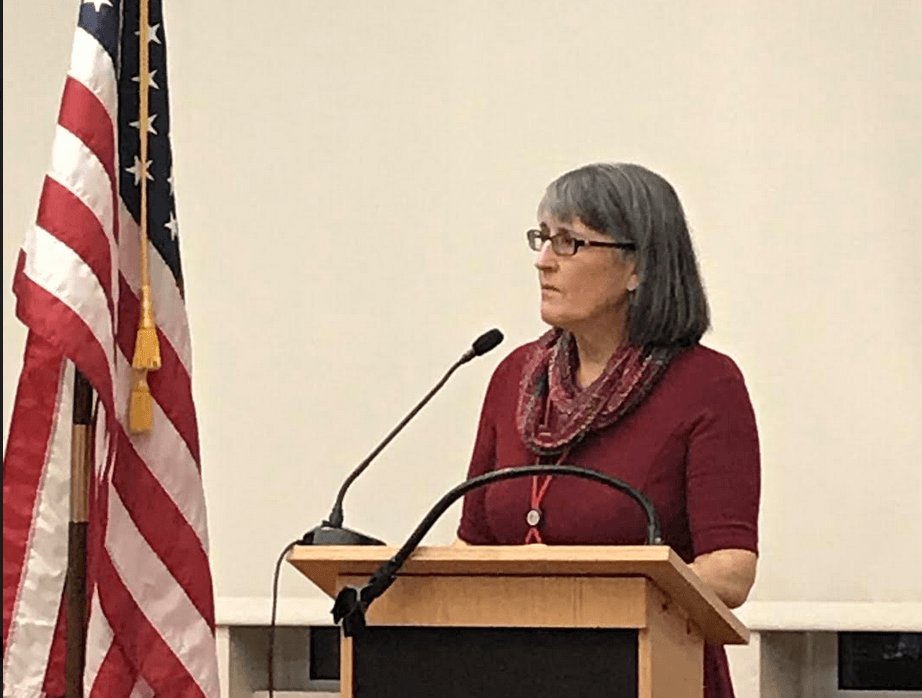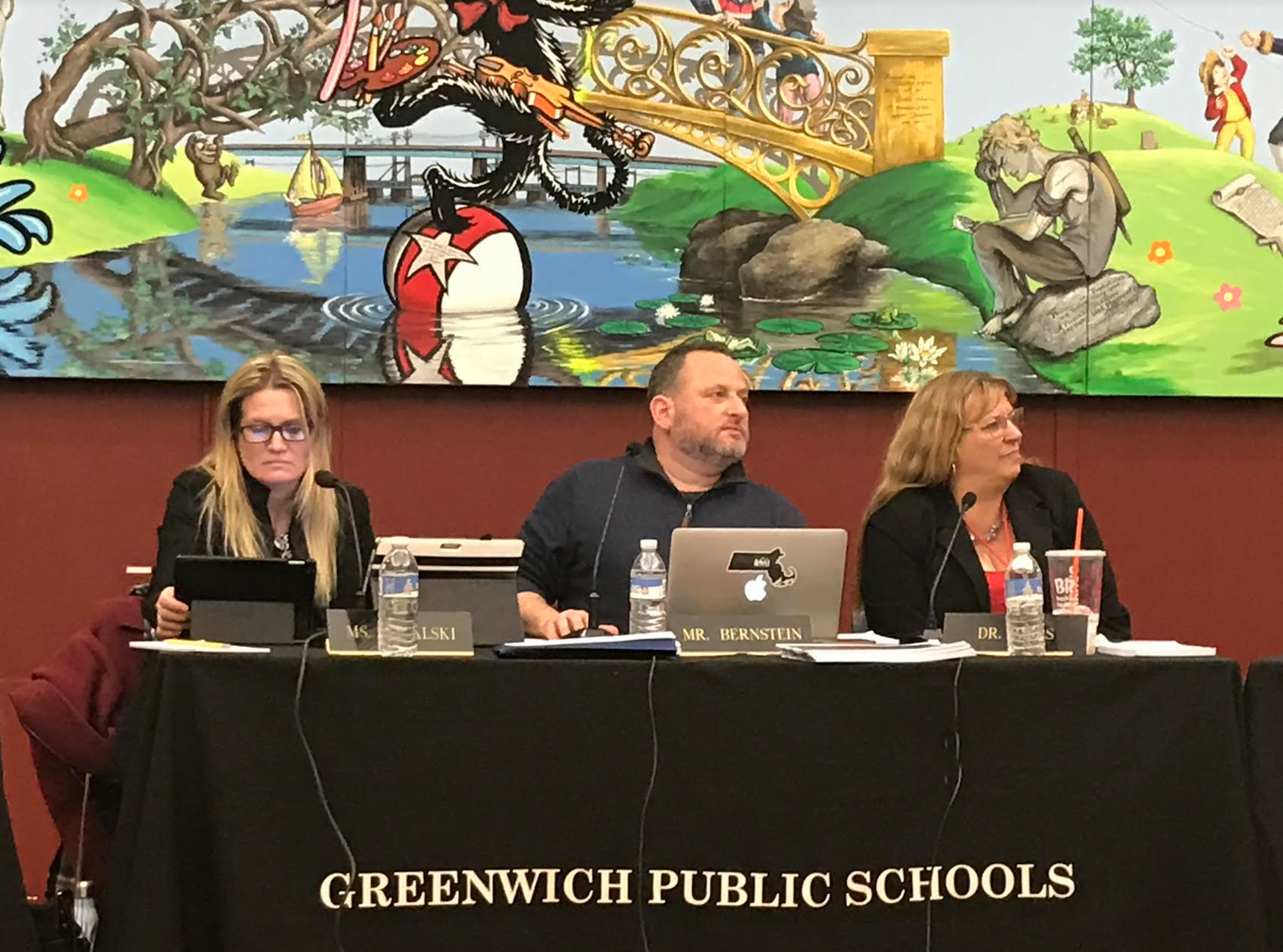At the Jan 16 Board of Education meeting at ISD, despite it not being an agenda item, special education was a theme throughout the four hour meeting.

Greenwich Education Association president Carol Sutton addressed the Board of Education on Jan 16, 2020 at ISD Photo: Leslie Yager
For starters, Carol Sutton, the president of the 900-strong teachers union, the Greenwich Education Association, said teachers have many concerns about how special education is staffed.
“It is adversely effecting every school, every student and every teacher,” she said, receiving a large round of applause from the audience.
Sutton said disturbing incidents like evacuations occur frequently.
An evacuation is when an entire class leaves a classroom because of one classmate’s emotional or physical breakdown. “Sometimes (evacuations) last a long time,” she said.
“We find that teachers and other adults are physically injured by students on a regular basis.
We have protocols in place. They go to employee health. They sometimes need to stay out on worker’s comp.
We also found that students are not getting their services. Why is this?”
– Carol Sutton, President of the Greenwich Education Association
Sutton said from their perspective as teachers, there aren’t enough paraprofessionals, professionals or specialized support staff in place, and faculty lack specialized training.
“While teachers are committed to the success of all students, “more than handful are sobbing in the parking lot every day,” Sutton said.
Ms Sutton said teachers welcome the opportunity to speak with Key 2 Ed and many teachers already have.
During public comment several special education parents said they were concerned that a Key 2 Ed report would be selective, that the Head of Special Education had “hand selected” the organization.
Lindsey Fahey questioned the makeup of the parents on the steering committee, and that names of parents on the committee were not made public despite other parents being instructed to funnel comments through them.
Diana Martinez, a former Greenwich Pubic School teacher, said she left teaching because she felt she couldn’t advocate for her students the way she could for her son.
“Advocating for other people’s kids would involve letting parents in on a secret code of exactly what to say or write, and to whom,” she said. “I needed a back channel though because it involved going against the PPT team at my school which was headed by the very administrator who completed my evaluation.”
“Being part of a PPT team should not mean participating in group think….Advocating for other people’s children is risky business in this district and it shouldn’t be.” – Diana Martinez
Martinez said that prior to a PPT with parents in Greenwich, teachers and administrators meet to discuss what will come up in the PPT and come to a consensus that risks resulting in a pre-determination.
“There is no protocol for teachers to challenge administrators. “by law teachers can disagree with the outcome of a PPT just as parents can. They can file a dissent. In 20 years of teaching, I’ve never seen that happen,” Martinez said.
Peter Sherr said the board had been calling for a comprehensive review of special education, and the contract with Key 2 Ed was separate.
“I don’t want to get into how previous board members pushed this through for three years of delay. That was of great frustration to me,” he said, going on to ask the superintendent when a comprehensive review would take place.
“If our budget goes through on July 1, we will put out an RFP to secure the service for next year,” Superintendent Jones replied.
Mr. Sherr asked whether there was a plan to have a session before the RFP was issued to discuss its contents.
He noted that in a recent review the Board had not properly articulated what was to be reviewed.
“Is there some perception that if we just do PPTs better, all is solved?” – Peter Sherr
“It was completely rigged,” Sherr said to more applause. “I understand why special ed parents are saying what they’re saying.”
“I worry about this fixation on facilitation of PPTs. I’m trying to understand Key 2 Ed. How does that fit?” Mr. Sherr asked.
“Does a cohesive and collaborative PPT process make a difference? Absolutely,” Dr. Jones replied. “We’re hearing over and over that the process does not feel like that for some of our families.”
Dr. Jones said staff are being trained to have a more collaborative PPT process. “I think that’s why the consultant is working with us now. They’re meeting with so many people as well as individually. I think it’ll be very helpful.”
Jones said she had met with many special education parents, including a mass meeting with a large number of people.
She said staff recognize that the Response to Intervention (RTI) process is not a strong process system-wide.
Jones also said the stakeholder committee had met once. “We tried to push out a lot of information about the process and the meeting.”
BOE member Meghan Olsson asked about the independence of Key 2 Ed. “What I’ve heard is very concerning,” she said.
“Is it correct they’re limiting topics that can be discussed? And is it true that Pupil Personnel Services Director Mary Forde played a roll in the process of who would participate? ” Olsson asked. “Do you see it as a conflict of interest?”
Dr. Jones said Key 2 Ed had no conflict of interest and the committee was balanced and included gen ed teachers, special ed teachers and parents.
Jones said from her perspective Key 2 Ed had no conflict of interest.
“This is a consultant company. They are not coming in to tell us what to do….They literally are gathering information from a broad group of stakeholders, and staff who wanted to meet with them. And they’re going to share with us what they’ve heard.”
– Dr. Toni Jones Greenwich Schools superintendent
“I’m not hearing that from the actual parents,” Mrs. Olsson said. “There’s a gross disconnect. As a board member, this is not what I had in mind. I think it’s time we re-evaluate.”
Dr. Jones said Key 2 Ed had yet to present data.
“I have grave concerns about this. We cannot have another special education review where we are fixing things, but parents are feeling they’re not being heard.” – Karen Hirsh
Chairman Peter Bernstein characterized Key 2 Ed as just one part of a process.
“We’re looking forward to a soup-to-nuts review next year – from identification all the way to provision of services. This is one snapshot,” he said.
Mr. Bernstein noted that special education is the most volatile part of the school budget.
“Like most districts in Connecticut, we are experiencing a higher volume of out-of-district placements. And it’s a challenge,” he said. “At this point we’re several hundred thousand dollars over where we thought we’d be.”
It is difficult to anticipate when special education services will needed. Students can move to the district at any time of the school year.
“Even if you try to anticipate them, it never seems to be enough,” Bernstein added, noting that the State returns some funds to the town to help cover unanticipated costs, but it’s less and less every year.
“It’s really hard to budget for….The state hasn’t kept up with the times. It’s put us in a really difficult position,” he added.
Dr. Jones said Key 2 Ed is valuable, because rather than sitting idle between now and June 1, Key 2 Ed has given training on IEP facilitation.
“I thought it was an excellent training,” Jones said. “we are training all our administrators on a more collaborative process….Key 2 Ed is not our audit or our review. This is a consultant.”
“I’m disappointed to hear people aren’t having good experiences. What I heard was positive because people feel like their voices are being heard,” Jones said.
Jones said she hoped people would be patient and allow the process to play out with the consultant.
At the end of the meeting there was discussion of the budget for special education.
“We have a $900,000 gap,” Mr. Bernstein said to the new Chief Operating Officer Sean O’Keefe. “You’re anticipating more in April. It’s a big number. Sadly it’s getting bigger.”
Mr. Sherr noted the new COO inherited a budget.
“And the trend is for $300,000 more – $1.3million over budget. It’s out of control,” Bernstein said.
Mrs. Olsson said she was very concerned.
“I’m not going to vote for this. Mary Forde and her leadership need to have more accountability,” Olsson said.
“This has got to end,” Ms Stowe said. “We’re started the meeting unhappy and ended it unhappy. I know it’s an unfunded mandate. It’s taking away from every other program.”
“It’s a river that’s busted its banks,” Mr. Sherr said. “It’s a management problem we have to get our arms around it.”